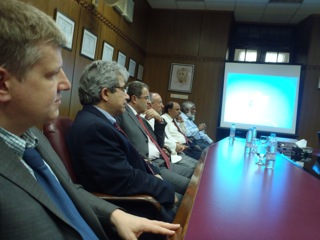
At its meeting on June 19, CERN Council authorised CERN management to finalise discussions with Pakistan for Associate Membership of CERN. This is the final stretch towards a major milestone for CERN: Pakistan would be the first Asian country to become an Associate Member of the organization.
Pakistan has a twenty-year history of collaboration with CERN that began with the signing of a Cooperation Agreement in 1994. Pakistani scientists and engineers have since carried out a number of successful projects for CERN – and particularly on CMS.
Pakistan had formally applied to become an associate member of CERN February 2013. Following a positive response from Council in October 2013, a Task Force of CERN experts visited Pakistan earlier this year. Upon its return, the team supported Pakistan's application. A short few weeks later, it was time for a CMS delegation to visit CERN. The group of CMS physicists consisted of Tiziano Camporesi (spokesperson), Paris Sphicas (deputy spokesperson), Austin Ball (technical coordinator), Andrzej Charkiewicz (resource manager), Frank Hartmann (tracker manager), Duccio Abbaneo (tracker upgrade manager) and Hafeez Hoorani (Pakistani representative and initiator of the Pakistan collaboration with CMS).
The purpose of the CMS delegation was to visit research institutions and universities in Pakistan – both those that are already members of CMS and potential new collaborators. The schedule was intense: in a short four days, the delegation visited the National Center for Physics (NCP), the Pakistan Atomic Energy Commission (PAEC), the National University of Sciences and Technologies (NUST) and the National Inst. of Vacuum Science and Technology (NINVAST), all in Islamabad; the Heavy Mechanical Complex 3 (HMC-3) in Taxila; the Institute of Nuclear Science and Technology (PINSTECH), and the National Institute of Lasers and Optronics (NILOP), both in Nilore; and Punjab Universiy (PU), the Government College University (GCU), and the Lahore University of Management Sciences (LUMS), all in Lahore.
Beyond the extraordinary hospitality it was met with, the CMS delegation had a very interesting set of meetings and were thoroughly impressed by the high level of enthusiasm and talent in the institutions visited. More importantly, there seems to be plenty of fertile ground for strengthening the collaboration with CMS, which was spearheaded by the long-standing successful efforts of the PAEC and NCP. There is now wide anticipation that this effort will expand to several other institutions. We can all look forward to a new era in which Pakistani effort on CMS will flourish.
By CMS delegation to Pakistan
- Log in to post comments

